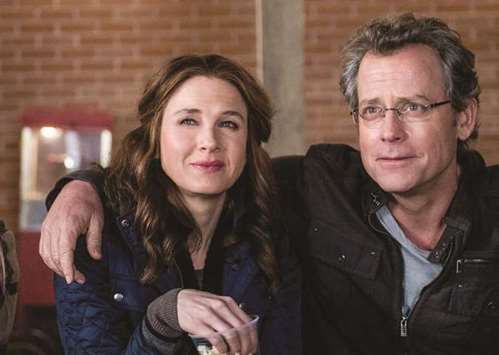In 1998, millionaire art dealer Ron Hall, a Fort Worth father of two and an adulterer, promised he’d do anything to win back his wife Debbie, a “girl with a heart so big that all of Texas couldn’t hold it.” Debbie gave him a challenge: help her feed the homeless at Fort Worth’s Union Gospel Mission and befriend the scariest man on the block, an ex-felon and murderer named Denver “Suicide” Moore.
He did, and the two men’s unusual friendship is the foundation of Michael Carney’s empathetic faith-based drama Same Kind of Different as Me, starring Greg Kinnear and Renée Zellweger as the wealthy white couple, and Djimon Hounsou as the traumatised sharecrop per welcomed into their 15,000-square-foot home. The film’s key draw is the nonfiction bestseller that inspired it, co-written by Hall, Moore and Heaven is For Real’s Lynn Vincent, who saw her first book become a surprise $100 million dollar box office hit in 2014. Kinnear, who also starred in Heaven, clearly hopes the heavens will smile on him again.
Same Kind of Different as Me is Carney’s feature debut, and the director pushes the religious weepy genre closer to art. When Ron confesses his affair to Debbie, Carney cuts out the big revelation and instead films their fight in stylised fragments: the couple silent on the couch, then standing in tears, then quiet again, except for Debbie’s broken rebuttal to his excuse that they haven’t been intimate in two years. “We haven’t slept together in two years,” she clarifies. “We haven’t been intimate in 10.”
That night, she envisions padding through a dark hospital and when she reaches the elevator doors, Carney blinds us with a shot of bright, yellow grass and Hounsou, lean and rimmed with soft, white hair, strolling into the woods. To Debbie, the meaning is clear: Ron had been the man of her dreams. Now, he’s got to help her find her new one.
Zellweger’s wife is a surreal Southern creation. She looks like a trophy wife and never speaks above a mewl. In one shelter scene, the audience is treated to this chirpy exchange: “Hi, I’m Debbie. What’s your name?” “Killer.”
Yet, this soft kitten has a spine of steel. The film’s closing song, Stubborn Angel, featuring country legend Brad Paisley, was penned in her honour, and she represents the feminine strength of a forest of Giving Trees. She even calls up Ron’s mistress to say she hopes the home-wrecker finds someone who truly loves her — and in the film’s eyes, she means it. Zellweger isn’t given much of a character arc. She’s beatific in every beat. If she’d ever enjoyed being the rich housewife, Carney and his co-screenwriters Hall and Alexander Foard cut that out, while still implying that her selfish husband is shocked by her volunteerism. He’d rather write a blank check than roll up his sleeves and wash a dish. What if he catches a disease? Smiles Thomas Francis Murphy’s patient cafeteria worker, “We try to infect them all … with love.”
Debbie and Ron’s two teens, played by Austin Filson and Disney starlet Olivia Holt, are merely tasked with smiling supportively at their parents. It’s Denver’s childhood that matters to the movie: the fire that made him an orphan, the plantation owner who made him an illiterate, uneducated cotton-picker. These flashback scenes to Denver’s painful, sepia-toned youth are set in the 1950s, but look like they could have taken place a century before. (And Denver doesn’t help clarify the timeline when he says he’s never seen a “picture show,” an old-fashioned line that sets up the false expectation he could be a ghost.) When Ron takes Denver to an art museum, he proves to be an astute critic of Pablo Picasso, a man he’d never heard of before. Yet when they stand in front of giant photographs of the KKK by Andres Serrano, Denver quietly and fervently tells Ron the brutal memories those images trigger. Suddenly, Denver’s anger has context.
Same Kind of Different as Me is a strange, sincere and sometimes clumsy plea for old-fashioned Christian empathy. Carney pointedly puts the most negative stereotypes of the homeless into the mouth of Ron’s father (Jon Voight), an emotionally abusive drunk who literally says, “I’m the bad guy.” In moments like that, or when Denver says he can’t be Ron’s friend if he does catch-and-release fishing, it’s hard to take the movie seriously. — Variety
DVDs courtesy:
Saqr Entertainment Stores, Doha

ACTION: Renee Zellweger and Greg Kinnear in a scene from Same Kind of Different As Me.
